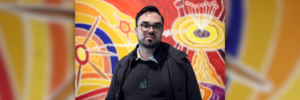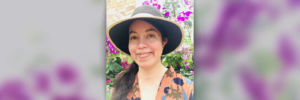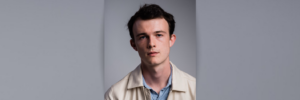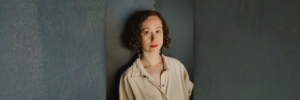
Arihia Latham (Kāi Tahu, Kāti Māmoe, Waitaha) is a writer, creative, māmā and rongoā practitioner. You will recognise her from literary festivals all over the motu, where she has performed her powerful poetry and chaired incredible events with a range of writers, from emerging to Aotearoa’s literary greats. A fierce kaitiaki of the taiao and supporter of the indigenous arts scene, her long-awaited first poetry collection Birdspeak was launched last week, at Matariki, published by Anahera Press.
Congratulations e hoa on bringing Birdspeak into Te Ao Mārama! Can you tell us what Birdspeak is about and who needs to be reading it?
Aww ngā mihi!! Birspeak is a collection of poems that come from inside but search and ask and settle and sigh till they find there place here in te ao mārama. They are poems that feel hopeful, resentful, cheeky, in love and at peace. I wanted them to be from the mouths of birds, those in the names of my tīpuna, in the waiata of my iwi, and in the tohu of my life. The book has a Kāi Tahu waiata Manu Tiria at the start which speaks of the Pīpīwharauroa returning to tell us to dig (to plant kumara) and take action and I feel like I often needed this as a reminder to keep writing- to do it! The book is in three sections and starts with Pūatatangi, the dawn song- a collection of atua poems, beginnings and stories from the past. It then moves to the middle section Manu Tiria, after the waiata of the digging bird, which is where some of the poems of struggle, loss and love come in. In the final section Karanga Porehu; dusk song, the poems are more about reflection, and hope, poems of thanks.
I feel like this is a really personal collection, but it is also full of common feelings as we all navigate our identity and purpose in the world, so I think it’s for everybody.
Sometimes writers talk about their book as if it is something they’ve birthed – a struggle as well as a gift. If you were to think of your book this way, who are its whanuanga? Who helped you bring this book into the world?
I love this metaphor. It really felt like I was birthing this- at times it was hard work, at others, there were lulls of uncertainty or decision-making. There was also a very clear transition time when I wanted to quit, and then the final push to bring relief, disbelief and just an amazing feeling of happiness. I couldn’t have done it without my beautiful writing community inspiring me, my friends in my DMs talking me down when it got hard, my kids, partner and whānau for supporting me, and my editor and publisher for helping me navigate the process so calmly. My friend and the cover artist Natalie Couch (Ngāti Tūwharetoa, Te Arawa) also gifted me the cover painting years ago and its imagery helped to shape the book as it was coming together. It’s been a process of many people guiding me with kindness, generosity and feedback and I’m very grateful.
Birdspeak is a collection full of the imagery and songs of the natural world and of course – manu. To what extent does your writing process or tikanga involve te taiao?
My writing process sometimes happens in the taiao or I need to stop writing when things aren’t flowing and reconnect with the taiao- by walking or running in the ngahere, swimming in the moana or gardening. I find I really stop and listen in nature, surrender to the bigness of it, it’s so humbling. That feeling informs and helps me to re-navigate my mahi toi.
One of your areas of expertise is rongoā – which is so prevalent in your writing. To what extent was the writing of Birdspeak a rongoā for you?
Writing poetry is definitely like rongoā, it is the way I make sense of the world. It is a satisfying creative process because it can swiftly find resolution. I think this collection, like many first collections, is informed by my life till now, and is a balm to the difficulty and challenge that has existed in that time. It’s a little dark at times, it talks about some hard things, but it finds ways to move through them and hold hope. That is the rongoā for me, making peace with it all.
People have been asking you for years to publish a collection of poetry, what was it about working with Anahera Press that appealed to you?
Ha! Yeah, it’s been a longer process than some for sure. I was bringing up my children and providing for us on my own for a lot of years so I couldn’t prioritise my creativity as much as I wanted. I feel proud that it’s finally here. I wanted a Māori publisher and I have really appreciated Kiri Piahana-Wong from Anherea Press as an editor when I have worked with her in other anthologies. She’s straight up, clear, calm and supportive. We seem to just align when it comes to the vision for the poems and I feel really lucky.
Photo credit: Amber-Jayne Bain




